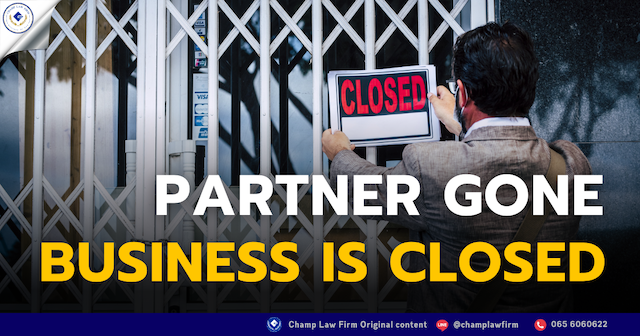Table of content
- Partner dies: Is business closure mandatory?
- Must you do business with the deceased partner’s heirs?
- Partner dies: how to handle business debts?
- What to do when a partner dies?
Starting a business with close associates, we prioritize capabilities and relationships because we choose who will partner with us.
Whether it’s a long-time friend trusted with financial matters, a skilled individual impressed us with their product and service skills, or a relative excellent in management, today
I’ll address a common but often overlooked issue: “If a partner dies, the business might need to close.”
This is a significant issue that many don’t pay attention to until they end up in court.
This article does not refer to shares in a limited or public company, as these entities clearly separate the business from the individual owners or partners.
Today, I’ll discuss the perspective of an ordinary partnership and a limited partnership, where the unique contribution of managing partners remains crucial.
Partner dies: Is business closure mandatory?
Yes, because the law views the presence of partners as crucial to the business’s heart and soul.
Without this partner, other partners may be unwilling to continue, leading to the immediate cessation of business activities.
Upon cessation, the business must settle accounts, calculate profits and losses, and allocate funds to pay off debts.
Any remaining funds are divided according to the agreed proportions or the contract.
Must you do business with the deceased partner’s heirs?
This depends on whether there was an agreement about this in the partnership contract.
If there was an agreement stating that the business can continue with the heirs, then the heirs can step in as new partners.
If specified in the contract, the business continues, and the heirs will become partners in place of the deceased partner.
Thus, you must continue the business with the deceased partner’s heirs as agreed upon initially.
Besides the partnership agreement, this clause can be recorded with the Department of Business Development in case of a registered partnership.
Partner dies: how to handle business debts?
If a partner dies but the business still has debts, you must first settle the business’s accounts to determine available assets or income.
These funds are then used to pay off debts. Any remaining funds are then divided according to the agreed proportions.
If there are insufficient funds to cover the debts, creditors can claim the remaining debts from the deceased partner’s estate (only if the partnership has unlimited liability).
Other partners cannot simply pass the debt collection responsibility to the deceased partner’s estate.
Debts related to the business must be settled using the business’s assets first.
What to do when a partner dies?
First, check if the partnership agreement or regulations specify the heir’s right to step in as a partner.
If not specified, the partnership must be dissolved, meaning the business must be closed (closing the business in this context means ending the partnership; continuing the store personally is a different matter).
If specified, the heirs will become partners by contacting the deceased partner’s estate manager and quickly identifying which heir will become a partner to ensure uninterrupted business operations.
Conclusion
In unregistered or limited partnerships, the managing partner’s presence is crucial. Many do not realize that the business must be closed or the partnership dissolved when a partner dies.
Therefore, regardless of your business size, it is advisable to consult a lawyer to draft a partnership agreement and review future rights and duties to avoid legal problems.



Contact Lawyer CLICK
Send us an email
info@champ-lawfirm.comCall us
065 6060622
Chat with us
ID: @champlawfirmVisit at office
47/86 Pattaya Klang Rd.